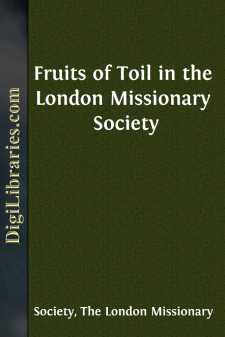Categories
- Antiques & Collectibles 13
- Architecture 36
- Art 48
- Bibles 22
- Biography & Autobiography 813
- Body, Mind & Spirit 142
- Business & Economics 28
- Children's Books 14
- Children's Fiction 11
- Computers 4
- Cooking 94
- Crafts & Hobbies 4
- Drama 346
- Education 46
- Family & Relationships 57
- Fiction 11829
- Games 19
- Gardening 17
- Health & Fitness 34
- History 1377
- House & Home 1
- Humor 147
- Juvenile Fiction 1873
- Juvenile Nonfiction 202
- Language Arts & Disciplines 88
- Law 16
- Literary Collections 686
- Literary Criticism 179
- Mathematics 13
- Medical 41
- Music 40
- Nature 179
- Non-Classifiable 1768
- Performing Arts 7
- Periodicals 1453
- Philosophy 64
- Photography 2
- Poetry 896
- Political Science 203
- Psychology 42
- Reference 154
- Religion 513
- Science 126
- Self-Help 84
- Social Science 81
- Sports & Recreation 34
- Study Aids 3
- Technology & Engineering 59
- Transportation 23
- Travel 463
- True Crime 29
Fruits of Toil in the London Missionary Society
Description:
Excerpt
Fruits of Toil
IN THE
When our fathers established this Society they were met by a formidable array of difficulties of which we know nothing. Gathered in fellowship when the infidel principles of the French Revolution were doing deadly work, and soon involved in the national struggle of the great war, they found little to encourage them in the outward aspects of their position. Christian men were few; Christian churches were small and scattered; money was scarce; Christian benevolence was little understood. The wide world of Christian effort opened to us was almost wholly closed against them. They could enter the South Seas; though their islands were almost unknown. But the West Indies were close shut. "If you preach to the slaves," said the Governor of Demerara to a missionary, "I cannot let you stay here." They were excluded from South Africa and from India. China was sealed, and remained so for forty years. Passages were expensive; voyages were full of discomfort; letters were few. They knew little of the manners and systems of heathen nations; they knew less of their literature; they knew nothing of their languages. Dictionaries, literature, buildings, converts, everything had to be produced. Their fields of labour were unprepared. Their message and their aims were little understood.
In all these elements of usefulness we occupy at this hour a position of usefulness, in marked contrast to that of our predecessors. With a mighty advance in practical freedom, in intelligence and education, in social comfort, in material resources, the entire religious life of England has secured a solidity, an elevation, and a general influence of the most marvellous kind. In the number and wealth of our churches, in the character and position of the ministry, the Society ought to find supporters immeasurably in advance of the few but earnest friends of seventy years ago. Our missions have made indescribable progress. Our agencies continue to grow more complete. Churches have been gathered; the members of which are no longer novices in Christian truth and Christian life. The time has come for a native ministry; and a larger number appear on our lists than ever before. And last, but not least, the full and faithful preaching of the gospel, for which our missionary brethren have ever been distinguished, and the employment of Christian education, have made a marked impression upon heathenism; have broken its prestige, have silenced its objections, and have prepared the way for future victories, more triumphant in their grandeur than anything the Society has yet seen.
But this advanced and noble position, which is the proof of success in the past, and the guarantee and instrument of larger results in days to come, is precisely that attainment and possession of our Society, which the friends of the Society appear least to appreciate. It seems to be thought that now, as ever, missionaries just preach to the heathen and give away books; they teach a few boys and girls; win a few souls; and send a few teachers into the districts around....


